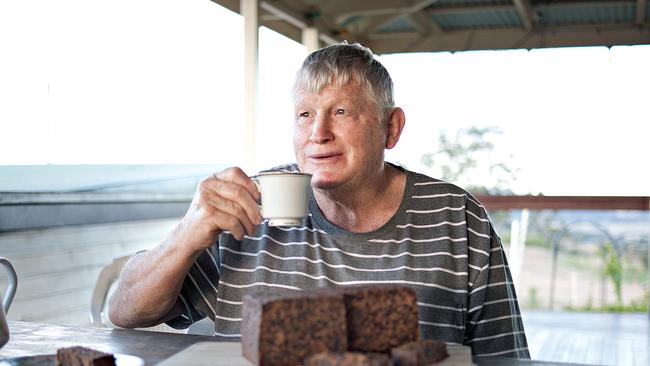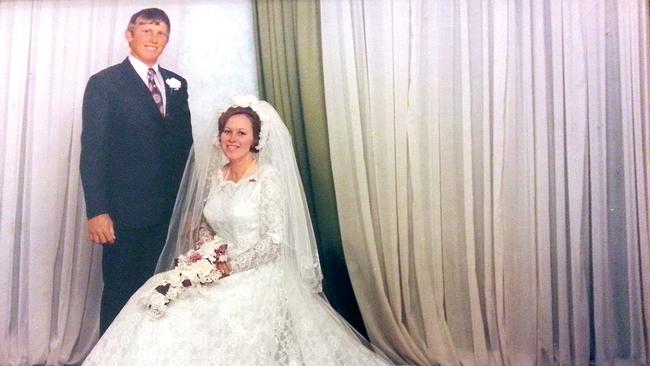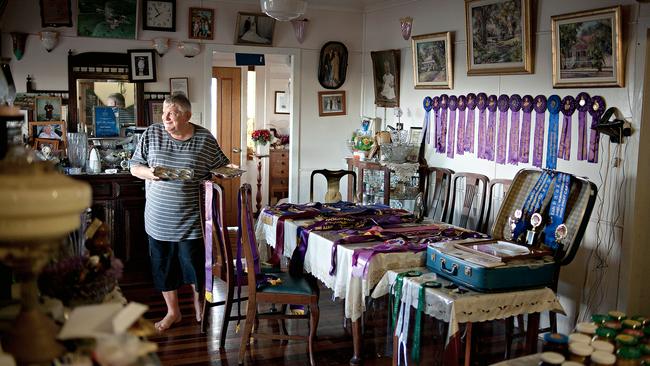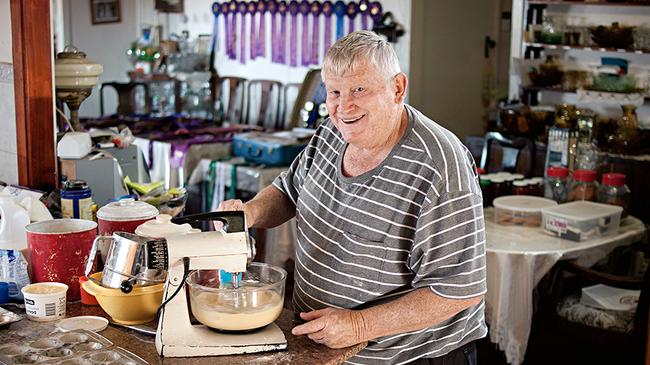The secret ingredient in Geoff Beattie's rich dark fruit cake
In the midst of despair, a widowed dairy farmer is gripped by a strange compulsion — to bake.

He shuffles away from the living room table and for a moment it seems his secret ingredient must be in the pantry by the old farmhouse pots and pans that he uses to make his prize-winning jams, pickles and cakes. But his secret isn't there.
He passes the kitchen and for a moment it seems the secret behind the slow-walking, crook-backed 68-year-old dairy farmer’s peculiar culinary genius must be locked away in the sky-blue 1960s trunk resting on his dining table, holding the 3082 blue and purple ribbons and gold medals awarded to him throughout 24 years of show cooking. But his secret isn’t there.
He moves to an antique dark brown hardwood chest of drawers, left to him in his late mother Lily’s will. There are pictures and messages and keepsakes adorning it: a black and white photograph of his dad, Robert, in his World War II uniform; a framed daily reminder to himself that reads, “Anyone can be a father but it takes a special person to be a dad.” But his secret isn’t there.
Then he looks up at the wall above the chest of drawers to a framed portrait of a woman in a wedding gown, clutching a bouquet of flowers. “My wife,” he says. It’s her. It’s always been her.
“E …” the farmer says. “El …”
His heart and his memory won’t let him voice her name. His lips tremble and he puts a fist to his mouth as tears fill his eyes, fixed on that beautiful face in the frame. Elaine.
The old house sits on the grassy crest of a storybook dairy farm in the Glamorgan Vale township in southeast Queensland’s Lockyer Valley, off a dirt road that honours the Beattie family name. His kitchen looks out to a patchwork quilt of light green and dark green hills where, once upon a time, Geoff and Elaine oversaw a thriving dairy farm.
Bordering the house is a veranda where Geoff and his seven siblings slept as kids on summer nights. His walls are lined with landscape paintings of farmhouses. Piles of cookbooks and old food magazines have found corners to rest in throughout the inside of the house. On a table off the kitchen sits a local rag, some papers and pens, a few letters and files and a circular plastic container, the size of a large pizza, containing thousands of cherries, sultanas and currants that have been soaking for two weeks. He opens the lid of the container.
“Smell that,” he says.
It’s not a smell, it’s a state of mind, a place where people can go. It’s a smell that conjures images of forest walks and Snow White singing to blue birds and being a kid again staining your clothes and fingers beneath a mulberry tree.
“How did you do that?” I ask.
He whispers his response. “Time,” he says.
There are elements inside Geoff Beattie’s rich dark fruit cake that can be observed and judged by the naked eye. One could slice into the square slab of fruit cake resting here on his dining table and see evidence of how it came to be: 120g of blanched almonds, 60g of mixed peel, three packs of sultanas, two packs of raisins, one pack of currants, 60g of cherries. One could taste this masterwork and identify one tablespoon of marmalade, two tablespoons of vanilla, four tablespoons of rum, four tablespoons of sherry, an orange grated and juiced, ground cloves, lemon essence, mixed spice, brown sugar.
What would not be immediately apparent is that Geoff Beattie’s life story is buried inside the cake; that the cook’s greatest attribute is patience and a remarkable sense for time frames: how long a cherry needs to soak; how long a cake needs to bake; how long it takes a man to fall in love; how long it takes a heart to heal.
November 1, 1969: Geoff and Elaine’s first date. He asked her to the local “Queen of the Vale” ball. Elaine’s dad, Colin, was a hard man, a stern, no-nonsense local farmer who felt the young men of Glamorgan Vale existed solely to distract Elaine from her duties working on the family farm. When Geoff asked her to marry him, the sentence that followed her emphatic “Yes” was a frantic, “But how do I tell Dad?”
Geoff vowed to tell him man to man. But Colin had a sense for such things and every time Geoff came to his door, Colin had disappeared: “Gone fishin’”; “Gone into town”; “Just gone”.
“He didn’t want it to happen because it meant he would be losing a worker,” Geoff says.
One day, Geoff hid outside Elaine’s house and waited for her father’s car to pull into the driveway. “What the f..k are you doing here?” was how Colin greeted him.
The quaking 25-year-old cleared his throat and stood defiantly. “I’ve got something to ask you,” he said. Colin snarled. “I’ve asked your daughter to be my wife and I’m asking for your consent,” Geoff said. Colin snarled again, and voiced his regret for not shooting Geoff the moment he laid eyes on him.
“You happy now?” Colin later asked his daughter. And Geoff was never surer of their love or that its time frame would be nothing short of forever than when Elaine replied to her father in an instant: “Yes. I. Am.”

Geoff looks to another framed photograph on the wall. Elaine is standing with a blue bandanna tied around her scalp, their children beside her: Jason, now 42, Shane, 40, Fiona, 35, and Grant, 33. “That’s July 1987,” he says.
Time frames. Two months between July 1987 and September 12, 1987, the day Elaine died, aged 38. Twenty-one months in total for Elaine to live with leukaemia. Seven weeks in isolation at the Royal Brisbane Hospital, not allowed to hug her kids for fear of infection. Seven weeks for the leukaemia ward’s then nursing supervisor Beverley Mirolo to watch true love at work; to watch Geoff let his dairy farm go into debt and ruin so he could spend every moment of his life beside his dying wife.
“He was so loving,” recalls Beverley, now 74. “It was a very hard time for him. I connected very easily to them. I was a reasonably young mother myself. I had four kids, like Elaine. Here’s this young mum in hospital having aggressive treatment and her husband is trying to bring money in for his family while looking after her.” She encouraged Geoff to simply keep talking. “Keep talking about memories,” she advised. “Say all those things you wanted to say but haven’t said.”
“Bev came to really care about Elaine,” says Geoff. “Elaine knew she was dying. She wanted to come home to be with her kids — and Bev, she put her in a wheelchair to come home to die, and when she left they both had a hug and they both had a cry and they knew that was going to be the last time they would see each other.”
Geoff points to where his fruits sit soaking. In 1987, this was the lounge area. “The night she died she came and sat here for a little while because she wanted to sit with the kids while they watched TV,” he says. “Then she said, ‘Geoffrey, take me to bed.’ And I put her to bed.”
The youngest kids, Fiona and Grant, then aged nine and seven, came in to their mum’s bedroom to say goodnight. They knew they were supposed to keep their distance. “Come on, give me a hug,” Elaine said. And the children squeezed their mum like never before.
Late that night Elaine woke Geoff, needing the toilet. She’d grown so weak that he would lift her onto a bedside commode. It took all her strength to sit up. “I’m buggered,” she whispered, then lay back down on her bed. “C’mon,” Geoff said. She had enough strength left in her to sit back up and wrap her arms around her husband’s neck. She died embracing him.
“It was 2.50am,” Geoff says.
A month later, Geoff was lying awake at night on that same bed in that same bedroom that he sleeps in to this day when his 13-year-old son Shane entered his room saying, “Dad, you’ve got to come talk to Grant.”
He rushed into Grant’s bedroom to find his youngest boy weeping uncontrollably. “Mummy died because of me, Dad,” his boy said. “I hugged Mummy, Dad. I hugged Mummy.”
• • •
A mature bull can weigh anywhere between 500kg and 1000kg. In June 1979, Geoff was supplementing his income from the dairy farm with work as a yardman at the local meatworks when a bull charged him from behind, crushing his spine. “Twelve months later I needed major surgery,” he says. Throughout his long, housebound recuperation Geoff and Elaine swapped roles: she worked the farm and he manned the kitchen. He made basic dishes, standard meat and veg, the odd stew. Gradually his repertoire expanded: pies, pastries, cakes and even his mother-in-law’s old recipe for marmalade. He came to love cooking for Elaine, but soon enough the Earth righted itself; Elaine was back in the kitchen and Geoff’s mended spine was bending downward once more to milk the cows.
Elaine’s 21-month battle with leukaemia coincided with a string of bad seasons on the farm. “We had some big debts,” Geoff says. “The farm had been run down very much when she got sick, because I was down at the hospital all the time, also raising the kids.”
In the weeks and months after Elaine’s death, Geoff suffered insomnia and barely functioned by day. “I’d be lying there and I just couldn’t go to sleep,” he says. “So I hit the bottle a bit. I’d had it. I don’t know if I’d get depressed. I’d get … sad, drink half a bottle of brandy.” He points to his kitchen cupboard. “I’d have the whisky bottles lined up above me cupboard there.”
Then, late one strange and divine night as he lay awake, lost and sunk deep in the depths of longing and despair, Geoff Beattie was struck by a profound and persistent compulsion to make marmalade. He rose from his bed and walked to the kitchen. He reached for his wooden chopping board and a bag of oranges and, as his children slept, he began slowly and carefully slicing orange rinds well into the night. He cut those orange rinds with such out-of-body precision that they were thin enough to dissolve on the tongue. On the stovetop he reduced his cooking liquid with such tenderness and innate understanding that, come morning, Geoff had created a marmalade so pure and so clear, it looked like the dawn sun had chosen not to rise outside his kitchen window that day but inside the glass jar he held in his hand.
Concerned neighbours and friends were often dropping in to check on Geoff’s welfare. One such guest tasted the marmalade.
“Who made this?” she asked.
“I did,” he said.
“I don’t believe you,” she said.
The woman instructed Geoff to continue with his cooking. So he did. He made jams, he made jellies, he made cakes. Soon all those spirit bottles atop his cupboard were being poured into his fruit cakes and not down his throat. Then another guest said his creations were show quality and said he should enter something into the local Marburg Show. So he did.
In 1990, he walked away from the Marburg Show with the first of his 3082 show cooking awards: first prize for the best bloody plum pudding the judge had tasted in a decade. So amazed by the depth of flavour was the flushed and light-headed judge that she struggled to spit out a three-word description of the wonder she’d just tasted: “This ... is ... perfect.”
At his first showing at Brisbane’s prestigious Royal Queensland Show he submitted 11 entries in a range of cake, jam and chutney classes and walked away with eight prizes. Geoff Beattie had arrived. Show after show, city after city, state after state, word began to spread about the mysterious widowed dairy farmer who was toppling the greats of Australian show cooking.
“He never had much in presentation but what he had was flavour,” recalls Alison Alexander, long-time Royal Queensland Show judge and the state government’s inaugural Queensland Food Fellow. “Flavour overrides everything. Absolutely everything. And flavour takes effort.”
Within a decade, Geoff had built enough confidence and skill to vie for the holy grail of show cooking accolades: the Florence Morgan Memorial Prize for Rich Dark Fruit Cake.
The prize is named in honour of a mid-1900s show cook and judge whom the Royal Queensland Show history books describe as a “white-haired, motherly woman” who could sense “spirit and determination” with her lethal tastebuds and whose judgments were as sharp as the carving knife she brought from home to leave entry cakes unsullied by her swift incisions. The Florence Morgan is the sort of show prize that sucks cooks in with the lustre of its lofty rewards and leaves them spent and delirious, turns them to nervous wrecks slamming their fists against oven doors wondering how it all went so wrong. Approximately 2kg of fruit to be used including currants (whole), sultanas and raisins cut and mixed peel. Cherries optional. Simple enough rules on paper, deceptively basic entry requirements with a yawning chasm left for the ambitious cook to improvise their way to glory or plummet to oblivion.
“It’s the pinnacle,” says Geoff.
Geoff walks to his living room wall where four ribbons are pinned in a row, each carrying the same four perfect words: “Florence Morgan Memorial Prize.” He won the holy grail in 2002, 2003, 2005 and 2009, all with his groundbreaking adaptation of a rich fruit cake recipe he took from Shirley Elsden’s More of Grandma’s Favourites, now gathering dust in a pile of cookbooks in his living room corner. “That’s the recipe,” he says, flipping through its pages. “But I did a bit of fiddling with it. I soak the fruit much longer than it says. The best cake I ever made, I soaked that fruit for two months.”
Perfection takes patience. Perfection takes time.

The sun would rise and fall beyond his kitchen window and the time-frame since the day he lost her widened. Their children grew and had kids of their own. The dairy industry rose and fell and rose again. In 2000 he jumped out, leased his farming land to people far wealthier than him. People were born, people died. Elaine’s dad, Colin, was put in hospital with liver failure. Every day, Geoff would visit the man he felt once despised him, helped him with his bed, helped him slip in and out of his pyjamas, because that’s what Elaine would have wanted him to do. On his deathbed, Colin turned to Geoff and said, “I apologise, Geoff, for the life I gave yer.”
People came and went and Geoff Beattie’s rich dark fruit cake built its hallowed flavour. “Geoff’s healing process was all in the kitchen,” says Alison Alexander. “Most blokes would turn to the bottle; he turned into a blue-ribbon cook.
“Clearly, it’s something that’s given him solace. In a funny sort of way it’s given him companionship. It’s a hands-on thing, cooking. You’ve got to get stuck in and be very involved in the process. When you get to his level, winning ribbons by the bucketload, you’ve really got to pay attention to detail. That’s the lovely part of his story. He’s taken it on with a vengeance. A competitor came out in him.”
Geoff smiles at his living room table, cluttered with about 100 clear glass jars of mustard pickles, two of which he will enter in the Royal Queensland Show. He taps his finger on a lid. “This got me through it,” he says. “Making all this stuff.” He nods his head and tears flood his eyes again. “I had the kids,” he says. “I had to be strong for them.”
For all the memories and ribbons and keepsakes adorning his walls, the thing he’s most proud of is a rectangular certificate resting on the chest of drawers beneath Elaine’s picture, an official recognition of his life membership of the Leukaemia Foundation of Queensland. It’s for his decades of fundraising and support, donating countless proceeds from auctions of his preserves, hosting endless high teas on his veranda to raise funds for families living with the disease. The certificate was presented to him in 2012 by Beverley Mirolo, OAM and Leukaemia Foundation president, the nurse who saw Elaine through isolation in 1987.
“He still really hasn’t gotten over the loss of Elaine,” says Beverley. “I think she’s right there with him when he makes those things. She’s never left his side … When you talk with him, Elaine will always come up in conversation somewhere. Always. I think he’s continued to be her partner even through her death.
“It’s a love story. And it’s not a tragedy because that love that he has for Elaine has never diminished. It’s probably increased, if anything, over the years. It got stronger.”
Geoff looks up once more to that face in the portrait on his wall. “I believe she sees it,” he says. “I believe she sees everything we do in this house. She sees us here. She sees everything I make. She sees everything I do.”
And his secret is here. For 24 years he’s been cooking for her. It’s always been her. And she deserves nothing less than perfection.
Postscript: Geoff’s rich dark fruit cake won the Florence Morgan Memorial Prize for the fifth time at last month’s Royal Queensland Show. His cooking won 31 awards in total. He considers it the best show of his career.

Geoff Beattie’s Rich Dark Fruit Cake
Ingredients
2 x 350g packets raisins
3 x 350g packets sultanas
1 x 350g packet currants
60g cherries
60g mixed peel
120g blanched almonds
Juice of 1 orange
4 tablespoons rum
4 tablespoons sherry
500g butter
500g brown sugar
10 eggs
1 tablespoon treacle
1 dessertspoon coffee essence
2 tablespoons vanilla
1 tablespoon lemon essence
60g self-raising flour
600g plain flour
½ teaspoon ground cloves
½ teaspoon salt
2 teaspoons of mixed spice
Method
Soak fruit overnight. Cut raisins, and any large sultanas or cherries. Put the rum and sherry over the fruit, and the juice of the orange. Mix well, leaving almonds to add next day. Beat the butter and sugar until creamy. Add eggs. Beat well after each egg. Add treacle and essence. Add dry ingredients. Lastly, add fruit mixture. Mix well. Bake in a 25-28cm sq tin, lined with Glad Bake. Cook at 150°C for two hours, then reduce to 120°C for another four hours or until cooked. Wrap in heavy towel and leave to cool.

